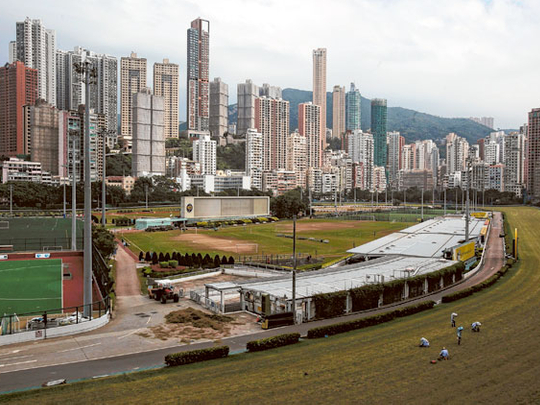
Hong Kong: Hong Kong is to introduce new property cooling measures, including a new 15 per cent tax on overseas buyers, to curb a rise in prices to increasingly unaffordable levels, Financial secretary John Tsang said on Friday.
It will also raise stamp duty on short-term property transactions to dampen speculation, the first time the government has taken such direct measures to curb what many see as excessive overseas buying, particularly from mainland Chinese buyers, for driving the market beyond record 1997 levels.
Tsang said these were extraordinary measures at an exceptional time, describing the market as “going against the economic fundamentals of Hong Kong”, fuelled by low interest rates, easy credit and a flood of mainland Chinese buyers.
“The risk of a property bubble forming has increased greatly. It may be a threat for the Hong Kong macro-economy and the stability of the financial system,” Tsang told reporters.
The city’s red-hot property market has risen about 20 per cent in the first nine months of this year, with even small and medium-sized units surging some 21 per cent.
The measures take effect on Saturday. They were announced after Hong Kong’s markets closed.
Hong Kong property stocks have been rising sharply this year with Cheung Kong (Holdings) Ltd up nearly 30 per cent and Henderson Land Development Co Ltd surging 48 per cent, beating an 18 per cent rise in the Hang Seng Index.
Overall impact limited
Analysts said the impact on the overall market would be limited as property prices would still rise due to demand, albeit more slowly.
“The measures will likely affect demand for luxury housing, which attracts foreign buyers most,” said Jonas Kan, an analyst at Daiwa Securities in Hong Kong. “But they probably won’t cause a major adjustment on property prices.”
Under the new measures, a so-called buyer’s stamp duty of 15 per cent would be imposed on non-Hong Kong permanent resident buyers and companies.
A so-called special stamp duty imposed on buyers seeking to sell their properties within two years of purchase would be imposed on buyers seeking to sell within three years.
The scale of stamp duty would be increased to 20 per cent for those selling within six months, to 15 per cent within a year and ten per cent from 12-36 months.
Foreign, or non-resident, buyers accounted for 19.5 per cent of total residential property sales in the primary market in 2011, up from 5.7 per cent in 2008. Foreign buyers accounted for 6.5 per cent of total residential transactions in 2011 against 3.1 per cent in 2008.
Analysts said the move was targeted at mainland Chinese, whose brisk purchases over the past few years have helped push up prices.
Local buyers
“The number of mainland buyers has been decreasing recently, so the measures may not do much. Local buyers are the ones who are actually buying,” said Wong Leung Sing, an analyst at Centaline Property Agency. “You can stop them for a while, but not forever.”
Previous initiatives by the government seem to have failed to halt the rise, with analysts saying expectations had prevailed that the market would likely continue to rise given a flood of hot money from the United States’ latest round of quantitative easing, low interest rates — and plentiful demand from mainland Chinese.
Hong Kong’s de facto central bank last month ordered banks to curb home loans to borrowers with more than one mortgage to prevent the city being flooded with hot money after the United States announced an aggressive new stimulus plan to spur growth.












